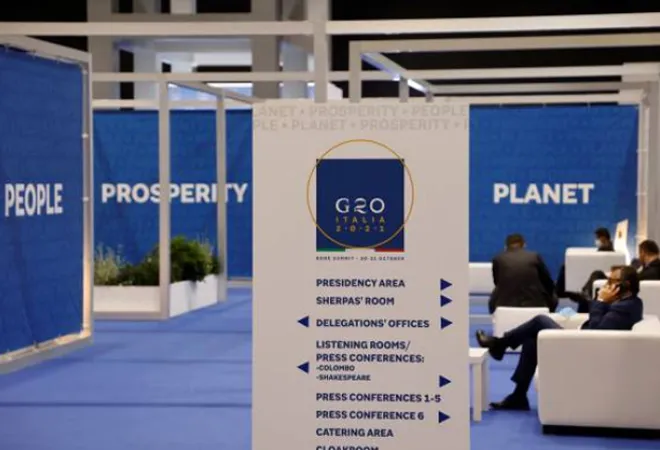-
CENTRES
Progammes & Centres
Location
Can G20 rise up to the occasion and meet the global expectations by coming to a universal agreement on crucial issues like trade and climate?
 The Group of Twenty (G20) has emerged as a leading global forum for international economic cooperation and rulemaking, comprising key advanced and emerging economies. It brings together the world’s major economies, accounting for 80 percent of the world’s GDP, 75 percent of global trade, and 60 percent of the population. It was one of the first multilateral forums to give both advanced and emerging economies an equal footing on the same platform. However, in recent years, the G20 has been subjected to increasing criticism for its lack of legitimacy and inadequacy in addressing global challenges. In the aftermath of the pandemic, existing fault lines have deepened and the gaps in expected recovery pathways have further widened. Moreover, evidence of friction and divergence in priority areas are visible in certain key issues of the G20 agenda.
The Group of Twenty (G20) has emerged as a leading global forum for international economic cooperation and rulemaking, comprising key advanced and emerging economies. It brings together the world’s major economies, accounting for 80 percent of the world’s GDP, 75 percent of global trade, and 60 percent of the population. It was one of the first multilateral forums to give both advanced and emerging economies an equal footing on the same platform. However, in recent years, the G20 has been subjected to increasing criticism for its lack of legitimacy and inadequacy in addressing global challenges. In the aftermath of the pandemic, existing fault lines have deepened and the gaps in expected recovery pathways have further widened. Moreover, evidence of friction and divergence in priority areas are visible in certain key issues of the G20 agenda.
The G20 has been subjected to increasing criticism for its lack of legitimacy and inadequacy in addressing global challenges.While the US blockage of appointment of WTO Appellate Body members has led the multilateral rules-based trading system into crisis, the Biden administration has not yet taken any action towards lifting the impasse at theAB. The G20 as a grouping has not been able to expedite the restoration of dispute resolution despite highlighting its urgency in several of its high-level meetings. Moreover, the G20 Rome Leader’s Declaration has not made any direct mention of this agenda. The underlying reason could be due to G20 countries’ varying proposals on how to proceed with the resolution. For instance, the EU proposed expansion of the AB and redefining the AB membership, whereas, Canada highlighted the need to update trade rules to ensure WTO’s relevance for modern trade issues. Additionally, while a Multi-Party Interim Appeal (MPIA) has been proposed by a group of countries, such a solution is short-lived as only 22 of the WTO’s 164 members or 6 of the 20 G20 members have so far joined this appeal. Further, the G20 leaders also highlighted the crucial role of the multilateral trading system in ensuring equitable access to medical supplies, vaccines, and pharmaceuticals. However, there is a wide gap in terms of global production and distribution of COVID-19 vaccines, medicines, and diagnostics between advanced and emerging and low-income economies— 60 percent of the advanced economies’ population are fully vaccinated; however, a whopping 96 percent of the low-income countries remain unvaccinated (as of October 2021).
The G20 as a grouping has not been able to expedite the restoration of dispute resolution despite highlighting its urgency in several of its high-level meetings.At the Italian G20 Trade and Investment Meeting in 2021, India called for removing the trade barriers such as vaccine differentiations, COVID passports, and other mobility restrictions, which can disrupt the flow of critical services. G20 members such as Indonesia, South Africa, and India further reiterated that one of the ways to demonstrate this is by accepting the TRIPS waiver proposal. Despite the Biden administration’s announcement of supporting the waiver, a few G20 members such as the EU, Germany, and UK continue to oppose any consensus on this proposal. According to the EU, Intellectual Property (IP) is not a barrier to increasing capacity to produce vaccines. The Commission argues that IP would not speed up manufacturing. Similarly, Germany claimed that “IP is a source of innovation and must remain so in the future”. According to Germany and the EU, the factors limiting the production of vaccines is not IP but high-quality standards, infrastructure, skills, and production capacities—something which the developing nations lack and cannot be overcome in a short period of time.
G20’s failure is reflected by its inability to make the private creditors (banks, hedge funds, and oil traders) a part of the debt suspension scheme.
The views expressed above belong to the author(s). ORF research and analyses now available on Telegram! Click here to access our curated content — blogs, longforms and interviews.

Shruti Jain was Coordinator for the Think20 India Secretariat and Associate Fellow Geoeconomics Programme at ORF. She holds a Masters degree in Public Policy and ...
Read More +